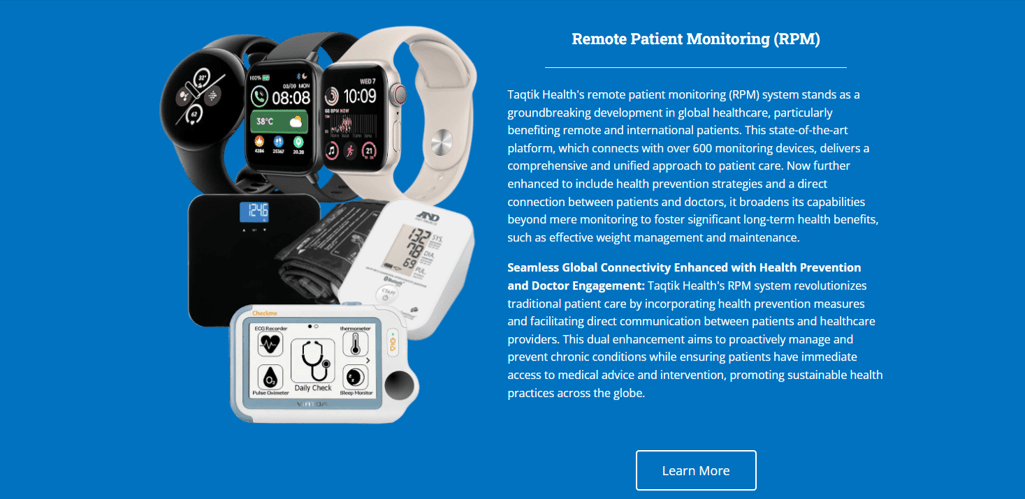Remote Patient Monitoring
Remote patient monitoring (RPM) has become an increasingly popular tool for patients returning home from surgery abroad. The benefits of RPM for these patients include the ability to monitor their progress and ensure they are following their post-surgery instructions, as well as the ability to quickly address any complications or issues that may arise

Remote Patient Monitoring for International Medical Travellers
Remote patient monitoring (RPM) is a rapidly growing field in healthcare that allows patients to receive care and monitoring from the comfort of their own homes, even if they have recently returned home after surgery in another country. RPM technology can help bridge the gap between hospital care and the recovery process at home, giving patients the peace of mind they need to fully recover.
One of the main benefits of RPM for patients returning home after surgery in another country is the ability to stay connected to their healthcare team. With RPM technology, patients can send data such as vital signs, symptoms, and pain levels to their healthcare providers in real-time, allowing them to monitor the patient's progress and make any necessary adjustments to their care plan. This can be especially beneficial for patients who have recently undergone a major surgery or procedure, as they may need close monitoring to ensure that they are healing properly.
Another benefit of RPM for patients returning home after surgery in another country is the ability to manage symptoms more effectively. With RPM technology, patients can track and report symptoms such as pain, nausea, and fatigue, which can help their healthcare providers identify any problems early on and take steps to address them. This can help prevent complications and ensure that patients are able to recover as quickly and comfortably as possible.
Additionally, RPM can also help patients stay on track with their post-surgery care plan, which can include physical therapy, medication management, and other treatments. RPM systems can provide patients with reminders and notifications to help them stay on schedule, and they can even track progress and compliance.
In conclusion, Remote patient monitoring can be extremely beneficial for patients returning home after surgery in another country. It allows them to stay connected to their healthcare team, manage symptoms more effectively, and stay on track with their post-surgery care plan, ultimately helping them to recover quickly and comfortably.
Remote Patient Monitoring for Bariatric Patients
Remote patient monitoring (RPM) has become an increasingly popular tool for bariatric patients returning home from surgery abroad. The benefits of RPM for these patients include the ability to monitor their progress and ensure they are following their post-surgery instructions, as well as the ability to address any complications or issues that may arise quickly.
One of the primary benefits of RPM for bariatric patients is the ability to monitor their weight loss progress. Many patients who have bariatric surgery abroad return home with specific instructions on how to manage their diet and exercise regimen in order to achieve optimal weight loss results. RPM allows physicians to monitor a patient's weight and other vital signs remotely, ensuring they adhere to their post-surgery instructions and progress toward their weight loss goals.
Another benefit of RPM is the ability to address any complications or issues that may arise quickly. Bariatric surgery can be a complex and risky procedure, and patients may experience complications such as bleeding, infection, or even blood clots. RPM allows physicians to monitor a patient's vital signs and other indicators of health remotely, allowing them to identify and address any complications that may arise quickly.
RPM also allows for greater continuity of care for patients who have had surgery abroad. With RPM, patients can communicate with their physicians remotely and receive the same level of care and support as if they were still in the hospital. This can be particularly beneficial for patients who live in remote or underserved areas, as it allows them to receive the care they need without having to travel long distances.
Overall, RPM is a powerful tool that can benefit bariatric patients returning home from surgery abroad. It allows physicians to monitor their progress and ensure they are following their post-surgery instructions while also allowing them to quickly address any complications that may arise. This can help patients achieve optimal weight loss results and improve their overall health and well-being.
Remote Patient Monitoring Testimonials
Great Experience
"Despite a minor hiccup with UPS delivering to the wrong address, the entire process, including setup, was impressively straightforward and hassle-free. The program significantly increased my awareness of my daily activity levels. I'm genuinely satisfied with the experience and would highly recommend it. Not only was it easier than manual tracking, but it also made a positive impact on my daily routine. Overall, it's been a great experience. ✅"
Fantastic job of keeping me aware of my habits
"The program's simplicity and straightforwardness have made it a breeze to navigate. It has done a fantastic job of keeping me aware of my habits, which is something I truly appreciate. I'm very satisfied with the experience, and I wholeheartedly recommend it to others. It seamlessly complements my lifestyle and wellness goals. Overall, it has been a fantastic addition to my journey. "
A valuable addition to my health regimen
"My journey with this program has been pleasantly straightforward, thanks to the well-provided instructions. Although I haven't noticed significant changes, I appreciate the effort. While I may not fully grasp its purpose, I am open to recommending it to others. My experience has been consistent, and it's a valuable addition to my health regimen. ♀️"
A good addition to my daily routine
"I must say, my experience was quite impressive. I managed to clock in 9k steps, which felt like a great achievement. While the journey was mostly smooth, I did have an allergic reaction to the band, which was a minor setback. Nevertheless, I would definitely recommend this program; my overall impression is positive. It's been a good addition to my daily routine. "
The motivation it offers is remarkable
"I found the process to be refreshingly straightforward. Receiving detailed instructions before getting the device allowed me to prepare effectively. This platform has truly opened my eyes to my weight and overall health. It has provided me with a clear direction on what to focus on, and the motivation it offers is remarkable. I'm genuinely satisfied with the platform; it didn't disrupt my daily life and was easy to tackle. I wholeheartedly recommend this platform to others; it's incredibly user-friendly. While it may not replace the personal touch of follow-ups with my doctor, having both complements each other effectively during the post-recovery period. This digital solution has been an invaluable part of my journey. "
My overall experience has been great!
"My experience with this program has been quite enlightening. While there were occasional syncing hiccups, it actually made me more mindful of my daily activities. At times, I felt conflicted, but overall, it's been a positive journey. The device did give me a rash once, and I wished there was an option for indoor walking, but I adapted by using outdoor walking. It would be great if it could record all steps automatically, but I still found it very useful. I would definitely recommend it to others, as my overall experience has been great! "


